-
 Bitcoin
Bitcoin $82,509.8850
-2.52% -
 Ethereum
Ethereum $1,800.3816
-3.46% -
 Tether USDt
Tether USDt $0.9996
-0.02% -
 XRP
XRP $2.0537
-1.80% -
 BNB
BNB $589.5226
-1.44% -
 USDC
USDC $1.0000
0.02% -
 Solana
Solana $116.3439
-6.85% -
 Dogecoin
Dogecoin $0.1595
-5.58% -
 Cardano
Cardano $0.6479
-2.79% -
 TRON
TRON $0.2366
-0.33% -
 Toncoin
Toncoin $3.5766
-9.59% -
 UNUS SED LEO
UNUS SED LEO $9.3922
-0.34% -
 Chainlink
Chainlink $12.7758
-5.57% -
 Stellar
Stellar $0.2586
-2.92% -
 Avalanche
Avalanche $18.1038
-3.99% -
 Sui
Sui $2.2274
-5.69% -
 Shiba Inu
Shiba Inu $0.0...01219
-1.98% -
 Hedera
Hedera $0.1627
-3.05% -
 Polkadot
Polkadot $4.0427
-1.01% -
 Litecoin
Litecoin $82.8658
-2.85% -
 MANTRA
MANTRA $6.3993
1.10% -
 Bitcoin Cash
Bitcoin Cash $298.9153
-0.95% -
 Bitget Token
Bitget Token $4.4795
-2.24% -
 Dai
Dai $0.9999
0.01% -
 Ethena USDe
Ethena USDe $0.9994
-0.04% -
 Hyperliquid
Hyperliquid $11.7782
-8.21% -
 Monero
Monero $212.0245
-3.58% -
 Pi
Pi $0.5720
-14.14% -
 Uniswap
Uniswap $5.8118
-4.56% -
 Aptos
Aptos $5.0504
-4.12%
What is a decentralized application (DApp)? How is it related to blockchain?
DApps run on blockchains, using smart contracts for autonomous operation, offering decentralization, security, and transparency, unlike traditional centralized apps.
Mar 27, 2025 at 04:49 am
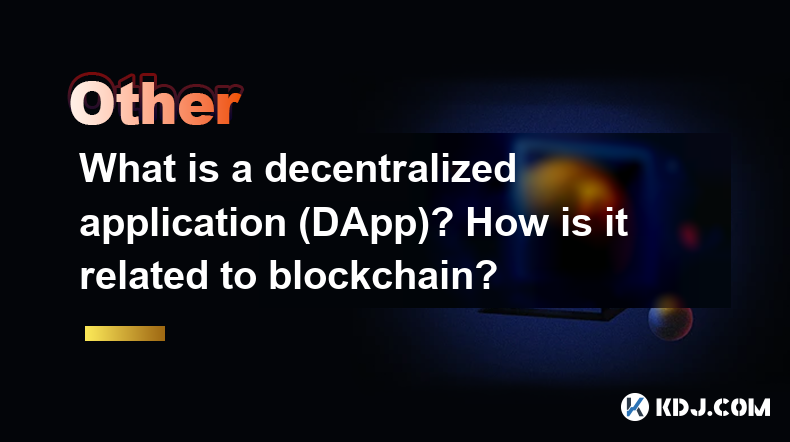
Understanding Decentralized Applications (DApps)
A decentralized application (DApp) is a software application that runs on a decentralized network, typically a blockchain. Unlike traditional applications that rely on centralized servers controlled by a single entity, DApps distribute their functionality across multiple nodes. This distribution enhances security, transparency, and censorship resistance. The core functionality of a DApp is encoded in smart contracts, self-executing contracts with the terms of the agreement directly written into code. This ensures that the application operates autonomously and predictably.
The Blockchain's Role in DApps
The blockchain acts as the backbone of a DApp, providing the infrastructure for its operation. It offers several crucial features:
- Decentralization: The distributed nature of the blockchain prevents a single point of failure or control. No single entity can shut down or manipulate a DApp running on a robust blockchain network.
- Immutability: Once data is recorded on the blockchain, it cannot be altered or deleted, ensuring the integrity and transparency of the DApp's operations.
- Transparency: All transactions and data are publicly viewable (depending on the blockchain's design), fostering accountability and trust.
- Security: Cryptographic hashing and consensus mechanisms protect the blockchain from unauthorized modifications and attacks, enhancing the security of the DApp.
The interaction between a user and a DApp usually involves the use of a cryptocurrency as a medium of exchange or interaction with the smart contracts. This cryptocurrency often serves as the fuel that powers the DApp's functions.
Types of DApps
DApps are not confined to a single type. They span a wide range of functionalities and applications, including:
- Decentralized Exchanges (DEXs): These platforms allow users to trade cryptocurrencies without relying on a centralized exchange, offering greater control and potentially enhanced security.
- Decentralized Finance (DeFi) applications: This encompasses a wide range of financial services built on blockchain technology, such as lending, borrowing, and yield farming, often offering higher yields than traditional financial institutions.
- Non-Fungible Token (NFT) marketplaces: These platforms facilitate the buying, selling, and trading of NFTs, digital assets representing ownership of unique items.
- Gaming DApps: These leverage blockchain technology to create immersive and engaging gaming experiences, often incorporating NFTs and cryptocurrencies.
- Supply chain management DApps: These track goods and materials throughout the supply chain, improving transparency and accountability.
How DApps Differ from Traditional Apps
The key differences between DApps and traditional applications lie in their architecture and governance:
- Centralization vs. Decentralization: Traditional apps rely on centralized servers, whereas DApps are distributed across a network of nodes.
- Data Storage: Traditional apps store data on centralized servers, while DApps often store data on the blockchain, making it immutable and transparent.
- Governance: Traditional apps are governed by a single entity, while DApps are governed by a decentralized community or smart contracts.
- Censorship Resistance: DApps are generally resistant to censorship due to their decentralized nature, unlike traditional apps which can be subject to censorship by the governing entity.
Building a DApp: A Simplified Overview
Creating a DApp involves several steps:
- Choosing a Blockchain Platform: Select a suitable blockchain platform based on factors such as scalability, security, and community support. Popular choices include Ethereum, Solana, and Polygon.
- Developing Smart Contracts: Write the smart contracts that define the logic and functionality of the DApp using appropriate programming languages like Solidity (for Ethereum).
- Front-End Development: Create the user interface (UI) that allows users to interact with the DApp. This typically involves using web development technologies like HTML, CSS, and JavaScript.
- Deployment and Testing: Deploy the smart contracts to the chosen blockchain and thoroughly test the DApp's functionality to ensure its reliability and security.
Security Considerations for DApps
Security is paramount in the development and deployment of DApps. Several factors need careful consideration:
- Smart Contract Audits: Professional audits are crucial to identify vulnerabilities in smart contracts before deployment. Exploitable vulnerabilities can lead to significant financial losses.
- Key Management: Securely managing private keys is critical, as compromised keys can grant access to user funds and data. Hardware wallets are recommended for enhanced security.
- Input Validation: Thoroughly validating user inputs is essential to prevent malicious attacks like reentrancy or overflow vulnerabilities.
- Regular Updates: Keeping the DApp and its underlying smart contracts updated with the latest security patches is crucial to mitigate emerging threats.
Frequently Asked Questions
Q: What are the advantages of using DApps?
A: DApps offer several advantages, including increased transparency, security through decentralization, censorship resistance, and immutability of data. They also often promote greater user control and autonomy.
Q: What are the limitations of DApps?
A: DApps can be more complex to develop and deploy than traditional apps. Scalability can be a challenge, and transaction fees (gas fees) can be significant depending on the blockchain network. Furthermore, the user experience can sometimes be less intuitive than traditional applications.
Q: Are DApps truly decentralized?
A: The level of decentralization varies depending on the DApp and the underlying blockchain. While many aim for complete decentralization, some may rely on centralized services for aspects like data storage or user interface hosting. True decentralization is an ongoing goal for many projects.
Q: How secure are DApps?
A: The security of a DApp depends on several factors, including the security of the underlying blockchain, the quality of the smart contracts, and the security practices employed during development and deployment. Well-designed and audited DApps can be highly secure, but vulnerabilities can still exist.
Q: What is the future of DApps?
A: The future of DApps is promising, with ongoing development in areas like scalability, usability, and security. As blockchain technology matures and adoption increases, DApps are expected to play an increasingly significant role in various industries.
Disclaimer:info@kdj.com
The information provided is not trading advice. kdj.com does not assume any responsibility for any investments made based on the information provided in this article. Cryptocurrencies are highly volatile and it is highly recommended that you invest with caution after thorough research!
If you believe that the content used on this website infringes your copyright, please contact us immediately (info@kdj.com) and we will delete it promptly.
- How XRPL Utility Can Support Token Price Growth
- 2025-04-04 05:35:12
- Long-dormant Bitcoin wallets have suddenly sprung to life
- 2025-04-04 05:35:12
- ExoraPad ($EXP), an innovative AI-powered launchpad exclusively developed for the XRP Ledger (XRPL), has reached an impressive milestone
- 2025-04-04 05:30:12
- XRP Price Surge Could Enable Early Retirement for Numerous Investors
- 2025-04-04 05:30:12
- XRP Price Prediction: Will XRP Bounce From This Support Or Continue Its Descent?
- 2025-04-04 05:25:12
- As US Treasury yields hit 6-month lows, Bitcoin (BTC) price may be poised for a breakout
- 2025-04-04 05:25:12
Related knowledge

What are the future development trends of blockchain game development?
Apr 03,2025 at 05:00am
Blockchain technology has revolutionized various industries, and gaming is no exception. As we look to the future, several trends are set to shape the development of blockchain games. These trends not only promise to enhance the gaming experience but also to integrate blockchain technology more seamlessly into the gaming ecosystem. Let's explore these t...

What are the maintenance costs of blockchain system development?
Apr 03,2025 at 06:07pm
The maintenance costs of blockchain system development are multifaceted and depend on various factors. These costs can include technical maintenance, security updates, infrastructure expenses, and personnel costs. Understanding these elements is crucial for anyone planning to develop or maintain a blockchain system. Technical MaintenanceTechnical mainte...
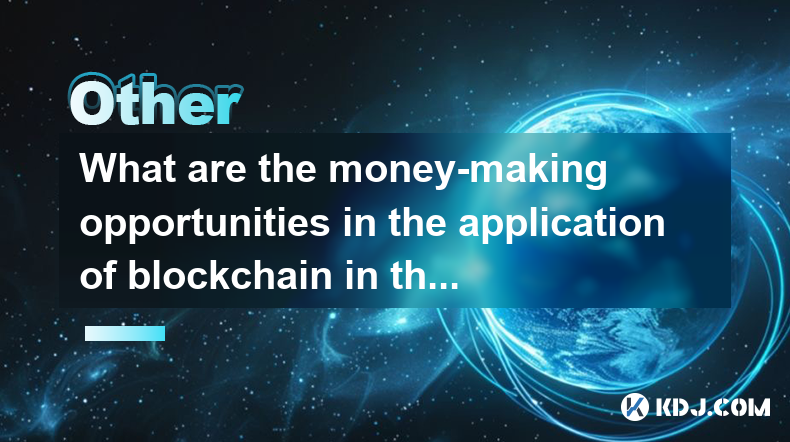
What are the money-making opportunities in the application of blockchain in the medical industry?
Apr 03,2025 at 03:35am
The integration of blockchain technology into the medical industry presents a myriad of money-making opportunities that can revolutionize healthcare systems. Blockchain's inherent characteristics, such as transparency, security, and immutability, make it an ideal solution for various medical applications. By leveraging blockchain, companies can develop ...
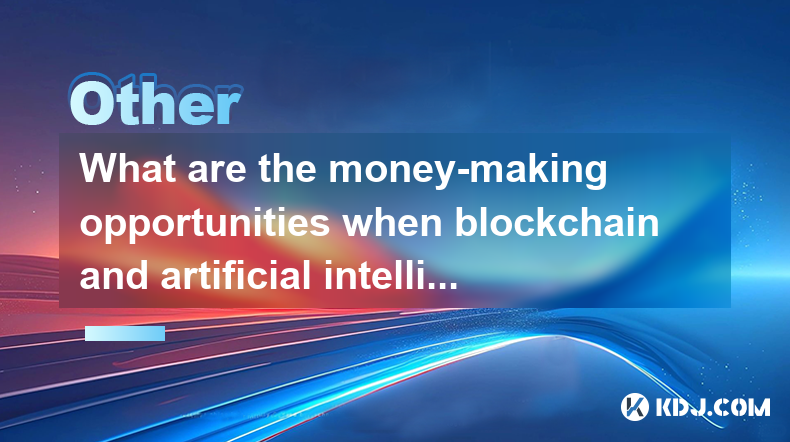
What are the money-making opportunities when blockchain and artificial intelligence are combined?
Apr 04,2025 at 01:28am
The convergence of blockchain and artificial intelligence (AI) presents a myriad of money-making opportunities within the cryptocurrency circle. This fusion leverages the decentralized and secure nature of blockchain with the analytical prowess of AI, creating innovative solutions and platforms that can generate significant revenue. From enhancing tradi...
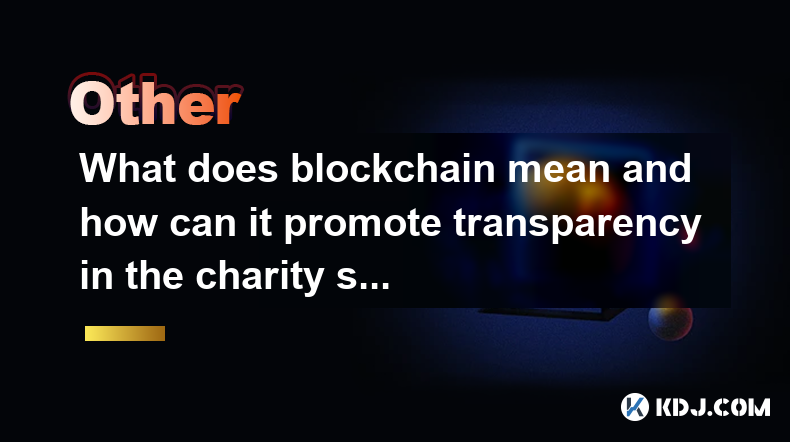
What does blockchain mean and how can it promote transparency in the charity sector?
Apr 03,2025 at 08:29pm
Blockchain technology is a decentralized, distributed ledger that records transactions across numerous computers. This ensures that the data is transparent and nearly impossible to alter retroactively. Essentially, blockchain serves as a digital ledger of all cryptocurrency transactions, enabling secure and direct exchanges without the need for intermed...
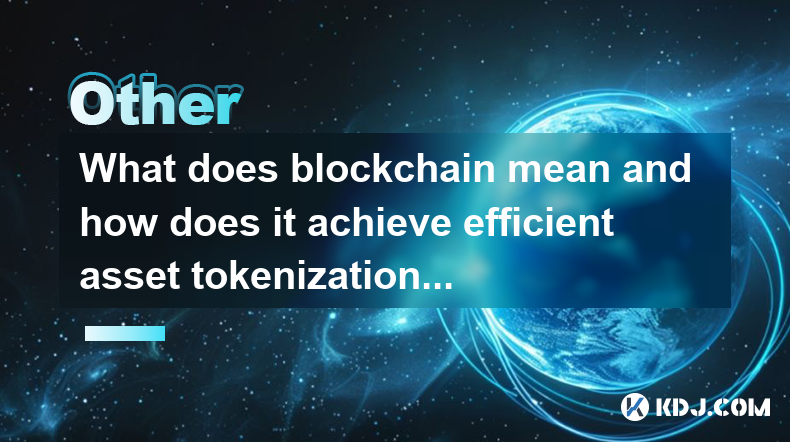
What does blockchain mean and how does it achieve efficient asset tokenization?
Apr 03,2025 at 07:57pm
Blockchain technology is a decentralized, distributed ledger that records transactions across numerous computers. It ensures that each transaction is secure, transparent, and immutable. The concept of blockchain was introduced with the launch of Bitcoin in 2009, but its applications have since expanded far beyond cryptocurrencies. At its core, blockchai...

What are the future development trends of blockchain game development?
Apr 03,2025 at 05:00am
Blockchain technology has revolutionized various industries, and gaming is no exception. As we look to the future, several trends are set to shape the development of blockchain games. These trends not only promise to enhance the gaming experience but also to integrate blockchain technology more seamlessly into the gaming ecosystem. Let's explore these t...

What are the maintenance costs of blockchain system development?
Apr 03,2025 at 06:07pm
The maintenance costs of blockchain system development are multifaceted and depend on various factors. These costs can include technical maintenance, security updates, infrastructure expenses, and personnel costs. Understanding these elements is crucial for anyone planning to develop or maintain a blockchain system. Technical MaintenanceTechnical mainte...

What are the money-making opportunities in the application of blockchain in the medical industry?
Apr 03,2025 at 03:35am
The integration of blockchain technology into the medical industry presents a myriad of money-making opportunities that can revolutionize healthcare systems. Blockchain's inherent characteristics, such as transparency, security, and immutability, make it an ideal solution for various medical applications. By leveraging blockchain, companies can develop ...

What are the money-making opportunities when blockchain and artificial intelligence are combined?
Apr 04,2025 at 01:28am
The convergence of blockchain and artificial intelligence (AI) presents a myriad of money-making opportunities within the cryptocurrency circle. This fusion leverages the decentralized and secure nature of blockchain with the analytical prowess of AI, creating innovative solutions and platforms that can generate significant revenue. From enhancing tradi...

What does blockchain mean and how can it promote transparency in the charity sector?
Apr 03,2025 at 08:29pm
Blockchain technology is a decentralized, distributed ledger that records transactions across numerous computers. This ensures that the data is transparent and nearly impossible to alter retroactively. Essentially, blockchain serves as a digital ledger of all cryptocurrency transactions, enabling secure and direct exchanges without the need for intermed...

What does blockchain mean and how does it achieve efficient asset tokenization?
Apr 03,2025 at 07:57pm
Blockchain technology is a decentralized, distributed ledger that records transactions across numerous computers. It ensures that each transaction is secure, transparent, and immutable. The concept of blockchain was introduced with the launch of Bitcoin in 2009, but its applications have since expanded far beyond cryptocurrencies. At its core, blockchai...
See all articles






















































































